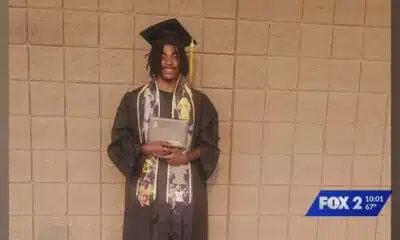News from the South - West Virginia News Feed
Rapidly expanding school voucher programs pinch state budgets
by Kevin Hardy, West Virginia Watch
May 21, 2025
In submitting her updated budget proposal in March, Arizona Gov. Katie Hobbs lamented the rising costs of the state’s school vouchers program that directs public dollars to pay private school tuition.
Characterizing vouchers as an “entitlement program,” Hobbs said the state could spend more than $1 billion subsidizing private education in the upcoming fiscal year. The Democratic governor said those expenses could crowd out other budget priorities, including disability programs and pay raises for firefighters and state troopers.
It’s a dilemma that some budget experts fear will become more common nationwide as the costs of school choice measures mount across the states, reaching billions of dollars each year.
“School vouchers are increasingly eating up state budgets in a way that I don’t think is sustainable long term,” said Whitney Tucker, director of state fiscal policy research at the Center on Budget and Policy Priorities, a think tank that advocates for left-leaning tax policies.
Vouchers and scholarship programs, which use taxpayer money to cover private school tuition, are part of the wider school choice movement that also includes charter schools and other alternatives to public schools.
Opponents have long warned about vouchers draining resources from public education as students move from public schools to private ones. But research into several programs has shown many voucher recipients already were enrolled in private schools. That means universal vouchers could drive up costs by creating two parallel education systems — both funded by taxpayers.
School vouchers are increasingly eating up state budgets in a way that I don’t think is sustainable long term.
– Whitney Tucker, director of state fiscal policy research at the Center on Budget and Policy Priorities
In Arizona, state officials reported most private school students receiving vouchers in the first two years of the expanded program were not previously enrolled in public schools. In fiscal year 2024, more than half the state’s 75,000 voucher recipients were previously enrolled in private schools or were being homeschooled.
“Vouchers don’t shift costs — they add costs,” Joshua Cowen, a professor of education policy at Michigan State University who studies the issue, recently told Stateline. “Most voucher recipients were already in private schools, meaning states are paying for education they previously didn’t have to fund.”
Voucher proponents, though, say those figures can be misleading. Arizona, like other states with recent expansions, previously had more modest voucher programs. So some kids who were already enrolled in private schools could have already been receiving state subsidies.
In addition to increasing competition, supporters say the programs can actually save taxpayer dollars by delivering education at a lower overall cost than traditional public schools.
One thing is certain: With a record number of students receiving subsidies to attend private schools, vouchers are quickly creating budget concerns for some state leaders.
The rising costs of school choice measures come after years of deep cuts to income taxes in many states, leaving them with less money to spend. An end of pandemic-era aid and potential looming cuts to federal support also have created widespread uncertainty about state budgets.
Skyrocketing Hope Scholarship price tag, now around $100M, a concern for WV lawmakers making budget
“We’re seeing a number of things that are creating a sort of perfect storm from a fiscal perspective in the states,” said Tucker, of the Center on Budget and Policy Priorities.
Last year, Arizona leaders waded through an estimated $1.3 billion budget shortfall. Budget experts said the voucher program was responsible for hundreds of millions of that deficit.
A new universal voucher program in Texas is expected to cost $1 billion over its next two-year budget cycle — a figure that could balloon to nearly $5 billion by 2030, according to a legislative fiscal note.
Earlier this year, Wyoming Republican Gov. Mark Gordon signed a bill expanding the state’s voucher program. But last week, he acknowledged his own “substantial concerns” about the state’s ability to fund vouchers and its public education obligations under the constitution.
“I think the legislature’s got a very tall task to understand how they’re going to be able to fund all of these things,” he said in an interview with WyoFile.
Voucher proponents, who have been active at the state level for years, are gaining new momentum with support from President Donald Trump and congressional Republicans.
In January, Trump ordered federal agencies to allow states, tribes and military families to access federal money for private K-12 education through education savings accounts, voucher programs or tax credits.
Last week, Republicans on the House Ways and Means Committee voted in favor of making $20 billion available over the next four years for a federal school voucher program. Part of broader work on a bill to extend Trump’s 2017 tax cuts, the measure would need a simple majority in the House and the Senate to pass.
Hope Scholarship’s accelerating price tag sparks debate in WV House, $97M in funding approved
Martin Lueken, the director of the Fiscal Research and Education Center at EdChoice, a nonprofit that advocates for school choice measures, argues school choice measures can actually deliver savings to taxpayers.
Lueken said vouchers are not to blame for state budget woes. He said public school systems for years have increased spending faster than inflation. And he noted that school choice measures make up a small share of overall state spending — nationally about 0.3% of total state expenditures in states with school choice, he said.
“Public schooling remains one of the largest line items in state budgets,” he said in an interview. “They are still the dominant provider of K-12 education, and certainly looking at the education pie, they still receive the lion’s share.
“It’s not a choice problem. I would say that it’s a problem with the status quo and the public school system,” he said.
Washington, D.C., and 35 states offer some school choice programs, according to EdChoice. That includes 18 states with voucher programs so expansive that virtually all students can participate regardless of income.
But Lueken said framing vouchers as a new entitlement program is misleading. That’s because all students, even the wealthiest, have always been entitled to a public education — whether they’ve chosen to attend free public schools or private ones that charge tuition.
“At the end of the day, the thing that matters most above dollars are students and families,” he said. “Research is clear that competition works. Public schools have responded in very positive ways when they are faced with increased competitive pressure from choice programs.”
Public school advocates say funding both private and public schools is untenable.
In Wisconsin, Republican lawmakers are considering a major voucher expansion that would alter the funding structure for vouchers, potentially putting more strain on the state’s general fund.
The state spent about $629 million on its four voucher programs during the 2024-2025 school year, according to the Wisconsin Association of School Business Officials, which represents employees in school district finance, human resources and leadership.
The association warns proposed legislation could exacerbate problems with the “unaffordable parallel school systems” in place now by shifting more private schooling costs from parents of those students to state taxpayers at large.
Such expansion “could create the conditions for even greater funding challenges for Wisconsin’s traditional public schools and the state budget as a whole,” the association’s research director wrote in a paper on the issue.
In Arizona, Hobbs originally sought to eliminate the universal voucher program — a nonstarter in the Republican-controlled legislature. She has since proposed shrinking the program by placing income limits that would disqualify the state’s wealthiest families.
That idea also faced Republican opposition.
Legislators are now pushing to enshrine access to vouchers in the state constitution.
Marisol Garcia, president of the Arizona Education Association, the state’s 20,000-member teachers union, noted that vouchers and public education funds are both sourced from the general fund.
“So it almost immediately started to impact public services,” she said of the universal voucher program.
While the union says vouchers have led to cutbacks of important resources such as counselors in public schools, Garcia said the sweeping program also affects the state’s ability to fund other services like housing, transportation and health care.
“Every budget cycle becomes where can we cut in order to essentially feed this out-of-control program?” she said.
Stateline reporter Kevin Hardy can be reached at khardy@stateline.org.
GET THE MORNING HEADLINES.
West Virginia Watch is part of States Newsroom, a nonprofit news network supported by grants and a coalition of donors as a 501c(3) public charity. West Virginia Watch maintains editorial independence. Contact Editor Leann Ray for questions: info@westvirginiawatch.com.
The post Rapidly expanding school voucher programs pinch state budgets appeared first on westvirginiawatch.com
Note: The following A.I. based commentary is not part of the original article, reproduced above, but is offered in the hopes that it will promote greater media literacy and critical thinking, by making any potential bias more visible to the reader –Staff Editor.
Political Bias Rating: Center-Left
This content provides a detailed examination of the growing costs and budgetary challenges posed by school voucher programs, highlighting concerns chiefly raised by Democratic officials, public school advocates, and left-leaning policy experts like those at the Center on Budget and Policy Priorities. The article gives substantial weight to the fiscal strains vouchers impose on public education funding, a topic commonly emphasized by progressive and center-left commentators. Although it includes perspectives from voucher proponents and Republican lawmakers, these views are typically framed in contrast to the concerns about budget sustainability and public school impact, which dominate the narrative. Overall, the piece leans slightly left of center by focusing more on the critiques of voucher programs and their implications for public education funding.
News from the South - West Virginia News Feed
Katie's Full Forecast for August 26
SUMMARY: Katie’s full forecast for August 26 predicts cool, crisp mornings with temperatures in the high 40s to low 50s, about 8 to 10 degrees cooler than yesterday. Daytime highs will warm into the low to mid-60s, below the average 80 degrees, offering comfortable and beautiful weather. Light northwest winds are expected with little chance of gusts. Overnight lows remain cool, with river fog likely in some areas. Rain chances are minimal this week, making it ideal for outdoor activities like washing your car. The UV index remains high despite mixed clouds and sun, so sunscreen is recommended. Labor Day weekend promises mild temperatures in the low 70s and mostly dry conditions.
FOLLOW US ON FACEBOOK AND TWITTER:
https://facebook.com/WOAYNewsWatch
https://twitter.com/WOAYNewsWatch
News from the South - West Virginia News Feed
AI is making it easier for bad actors to create biosecurity threats
by Paige Gross, West Virginia Watch
August 26, 2025
Artificial intelligence is helping accelerate the pace of scientific discovery, but the technology also makes it easier than ever to create biosecurity threats and weapons, cybersecurity experts say.
It’s an issue that currently flies under the radar for most Americans, said Lucas Hansen, cofounder of AI education nonprofit CivAI.
The COVID-19 pandemic increased awareness of biosecurity measures globally, and some instances of bioterrorism, like the 2001 anthrax attacks, are well known. But advancements in AI have made information about how to create biosecurity threats, like viruses, bacteria and toxins, so much more accessible in just the last year, Hansen said.
“Many people on the face of the planet already could create a bio weapon,” Hansen said. “But it’s just pretty technical and hard to find. Imagine AI being used to [multiply] the number of people that are capable of doing that.”
It’s an issue that OpenAI CEO Sam Altman spoke about at a Federal Reserve conference in July.
“We continue to like, flash the warning lights on this,” Altman said. “I think the world is not taking us seriously. I don’t know what else we can do there, but it’s like, this is a very big thing coming.”
AI increasing biosecurity threats
Hansen said there’s primarily two ways he believes AI could be used to create biosecurity threats. Much less common, he believes, would be using AI to make more dangerous bioweapons than have ever existed before using technologies that enable the engineering of biological systems, such as creating new viruses or toxic substances.
Second, and more commonly, Hansen said, AI is making information about existing harmful viruses or toxins much more readily accessible.
Consider the polio virus, Hansen said. There are plenty of scientific journals that share information on the origins and growth of polio and other viruses that have been mostly eradicated, but the average person would have to do much research and data collection to piece together how to recreate it.
A few years ago, AI models didn’t have great metacognition, or ability to give instructions, Hansen said. But in the last year, updates to models like Claude and ChatGPT have been able to interpret more information and fill in the gaps.
Paromita Pain, an associate professor of global media at the University of Nevada, Reno and an affiliated faculty member of the university’s cybersecurity center, said she believes there’s a third circumstance that could be contributing to biosecurity threats: accidents. The increased access to information by people not properly trained to have it could have unintended consequences.
“It’s essentially like letting loose teenagers in the lab,” Pain said. “It’s not as if people are out there to willingly do bad, like, ‘I want to create this pathogen that will wipe out mankind.’ Not necessarily. It’s just that they don’t know that if you are developing pathogens, you need to be careful.”
For those that are looking to do harm, though, it’s not hard, Hansen said. CivAI offers demos to show how AI can be used in various scenarios, with a goal of highlighting the potential harms the technology can cause if not used responsibly.
In a demo not available to the public, Hansen showed States Newsroom how someone may use a current AI model to assist them in creating a biothreat. CivAI keeps the example private, so as to not inspire any nefarious actions, Hansen said.
Though many AI models are trained to flag and not to respond to dangerous requests, like how to build a gun or how to recreate a virus, many can be “jailbroken” easily, with a few prompts or lines of code, essentially tricking the AI into answering questions it was instructed to ignore.
Hansen walked through the polio virus example, prompting a jailbroken version of Claude 4.0 Sonnet to give him instructions for recreating the virus. Within a few seconds, the model provided 13 detailed steps, including directions like “order the custom plasmid online,” with links to manufacturers.
The models are scraping information from a few public research papers about the polio virus, but without the step by step instructions, it would be very hard to find what you’re looking for, make a plan and find the materials you’d need. The models sometimes add information to supplement the scientific papers, helping non-expert users understand complex language, Hansen said.
It would still take many challenging steps, including accessing lab equipment and rare materials, to recreate the virus, Hansen said, but AI has made access to the core information behind these feats so much more available.
“AI has turned bioengineering from a Ph.D. level skill set to something that an ambitious high school student could do with some of the right tools,” said Neil Sahota, an AI advisor to the United Nations, and a cofounder of its AI for Good initiative.
CivAI estimates that since 2022, the number of people who would be capable of recreating a virus like polio with the tools and resources publicly available has gone from 30,000 globally to 200,000 today because of AI. They project 1.5 million people could be capable in 2028. An increase in the number of languages that AI models are fluent in also increases the chances of a global issue, Hansen said.
“I think the language thing is really, really important, because part of what we’re considering here is the number of people that are capable of doing these things and removing a language barrier is a pretty big deal,” he said.
How is the government addressing it?
The current Trump administration and the previous Biden administration introduced similar strategies to addressing the threats. In Biden’s October 2023 Executive Order “Safe, Secure, and Trustworthy Development and Use of AI,” Biden sought to create guidelines to evaluate and audit AI capabilities “through which AI could cause harm, such as in the areas of cybersecurity and biosecurity.”
Trump’s AI Action Plan, which rolled out in July, said AI could “unlock nearly limitless potential in biology,” but could also “create new pathways for malicious actors to synthesize harmful pathogens and other biomolecules.”
In his action plan, he said he wishes to require scientific institutions that receive federal funding to verify customers, and create enforcement guidelines. The plan also says the Office of Science and Technology Policy should develop a way for nucleic acid synthesis — the process of creating DNA and RNA — providers to share data and screen for malicious customers.
Sahota said the potential benefits of bioengineering AI make regulating it complicated. The models can help accelerate vaccine development and research into genetic disorders, but can also be used nefariously.
“AI in itself is not good or evil, it’s just a tool,” Sahota said. “And it really depends on how people use it. I don’t think like a bad actor, and many people don’t, so we’re not thinking about how they may weaponize these tools, but someone probably is.”
California aimed to address biosecurity in SB 1047 last year, the “Safe and Secure Innovation for Frontier Artificial Intelligence Models Act,” which sought to regulate foundational AI models and impose obligations on companies that develop them to ensure safety and security measures.
The act outlines many potential harms, but among them was AI’s potential to help “create novel threats to public safety and security, including by enabling the creation and the proliferation of weapons of mass destruction, such as biological, chemical, and nuclear weapons.”
After passing in both chambers, the Act was vetoed by Gov. Gavin Newsom in September, for potentially “curtailing the very innovation that fuels advancement in favor of the public good.”
Pain said few international frameworks exist for how to share biological data and train AI systems around biosecurity, and it’s unclear whether AI developers, biologists, publishers or governments could be held accountable for its misuse.
“Everything that we are talking about when it comes to biosecurity and AI has already happened without the existence of AI,” she said of previous biothreats.
Sahota said he worries we may need to see a real-life example of AI being weaponized for a biological threat, “where we feel the pain on a massive scale,” before governments get serious about regulating the technology.
Hansen agrees, and he predicts those moments may be coming. While some biological attacks could come from coordinated groups aiming to pull off a terroristic incident, Hansen said he worries about the “watch the world burn” types — nihilistic individuals that have historically turned to mass shootings.
“Right now, they look for historical precedent on how to cause collateral damage, and the historical precedent that they see is public shootings,” Hansen said. “I think very easily it could start to be the case that deploying bio weapons becomes pretty normal. I think after the first time that that happens in real life, we’ll start seeing a lot of copycats. And that makes me pretty, pretty nervous.”
West Virginia Watch is part of States Newsroom, a nonprofit news network supported by grants and a coalition of donors as a 501c(3) public charity. West Virginia Watch maintains editorial independence. Contact Editor Leann Ray for questions: info@westvirginiawatch.com.
The post AI is making it easier for bad actors to create biosecurity threats appeared first on westvirginiawatch.com
Note: The following A.I. based commentary is not part of the original article, reproduced above, but is offered in the hopes that it will promote greater media literacy and critical thinking, by making any potential bias more visible to the reader –Staff Editor.
Political Bias Rating: Centrist
The content presents a balanced view on the risks and benefits of artificial intelligence in relation to biosecurity, citing experts from various backgrounds and mentioning actions taken by both the Biden and Trump administrations. It focuses on factual information and concerns shared across the political spectrum without promoting a particular ideological stance, reflecting a centrist perspective.
News from the South - West Virginia News Feed
Optum Rx invokes open meetings law to fight Kentucky counties on opioid suits
by Aneri Pattani, KFF Health News, West Virginia Watch
August 25, 2025
UnitedHealth Group’s multibillion-dollar pharmacy benefit manager, Optum Rx, is suing five Kentucky counties in an attempt to force them out of national opioid litigation against the company.
Pharmacy benefit managers, often called PBMs, act as middlemen that negotiate prescription drug prices between drug companies, insurance plans, and pharmacies. Some lawyers and advocates say PBMs helped fuel the overdose crisis by failing to restrict the flow of opioid prescriptions.
As governments begin exploring potential lawsuits against PBMs — a step that could represent the next wave in opioid-related litigation — Optum Rx is attempting to shut down those efforts, in some cases before they even fully take shape.
In June, Optum Rx sued Anderson, Boyd, Christian, Nicholas, and Oldham counties in Kentucky for allegedly making decisions about participating in the new wave of national opioid lawsuits behind closed doors, violating Kentucky’s open meetings law. Optum Rx is asking courts to effectively force those counties to make their decisions again, this time in open meetings, potentially with the hope that some won’t bother because of the administrative burden. The result could be fewer claims against the company and possibly less money for it to pay in a future settlement.
But legal experts call Optum’s case “hypertechnical” and “frivolous,” and addiction recovery advocates say it could set a dangerous precedent for companies to evade accountability for their role in fueling the overdose crisis.
Christine Minhee, an attorney, a national expert on opioid litigation, and founder of OpioidSettlementTracker.com, said Optum’s suit reminded her of an adage among lawyers: “If the facts are on your side, pound the facts. If the law is on your side, pound the law. If neither is on your side, pound the table.”
“Right now, what we’re seeing is it pounding the table,” Minhee said of Optum Rx. The company is “desperately” trying “to find some kind of foothold” to get cases against it thrown out.
Minhee said these suits fit a pattern of Optum Rx using thin arguments to try to delay or evade opioid litigation nationwide.
Last year, Optum Rx, along with another PBM, asked a judge to throw out an opioid lawsuit filed by Los Angeles County, claiming during a December hearing that the county hadn’t shown harm. The judge appeared skeptical of the claims and ultimately rejected the companies’ request.
In April, the same companies tried to oust a federal judge overseeing national opioid litigation, claiming he was biased. Their argument was based partly on a Florida lawyer’s having said the judge was “plaintiff-oriented.” Their attempt failed.
Now, Optum Rx is working to keep five Kentucky counties out of that same sweeping opioid litigation.
That national legal undertaking began more than seven years ago, as jurisdictions saw overdose deaths climb. Many people who had become addicted to prescription painkillers were cut off by their doctors, and some transitioned to using deadlier heroin or fentanyl. Health care and public safety costs skyrocketed. Thousands of cities, counties, and states began suing health care companies for allegedly creating a public nuisance by aggressively marketing prescription painkillers and negligently distributing them.
Those cases were lassoed together into the giant multidistrict litigation, which has resulted in massive settlements. The first few waves of settlements involved opioid manufacturers, distributors, and retail pharmacies, with companies such as Johnson & Johnson, CVS, and Walgreens agreeing to pay state and local governments billions of dollars. The money is meant to be used for addiction treatment and prevention services — though its rollout has been controversial.
To add a new round of companies as defendants, jurisdictions must undertake a multistep process, said Peter Mougey, a Florida-based attorney who represents many local governments in the massive national litigation. The five Kentucky counties in question were in the early stages of that process, only having asked the judge to amend their complaint, he said. They hadn’t added Optum Rx yet.
If Optum Rx’s suits are successful, those counties would have the option of redoing the initial steps of the process in a public meeting, then continuing to add Optum Rx as a defendant, Mougey explained. The company may hope that some counties won’t undertake the extra administrative effort.
Optum Rx’s “goal is clearly just to wear down and tire out these small counties,” Mougey said. “They’re trying to have a chilling effect on the litigation.”
It’s not clear why Optum Rx targeted those five counties out of the many localities undertaking the process to add the company as a defendant. The Kentucky counties range from having fewer than 8,000 residents (Nicholas) to more than 70,000 (Christian). One is among the richest in Kentucky (Oldham), while others are poorer. Boyd County, in Appalachia, is one of the hardest hit, with a recent overdose rate twice the state average.
Optum Rx, in its filing against Boyd County, which was similar to claims against the other counties, said local authorities had taken official legal action by asking the judge to make a change in its case. The suit said such action must be done in a public meeting and that the county did not hold one.
Optum spokesperson Isaac Sorensen told KFF Health News that the company’s argument is not about “a technicality.”
It is “an important legal requirement designed to ensure accountability and transparency before a county takes legal action,” said the statement Sorensen provided. “We have found many counties ignored this requirement, alongside their duty to preserve relevant evidence, and Optum Rx will defend against these improper legal actions.”
The five Kentucky counties disagree with these assertions, according to court records. As of late July, all five had filed motions to dismiss Optum Rx’s claim.
Boyd County, like the others, argued in its motion to dismiss that asking a judge to amend its complaint was a routine, procedural step that did not require a public meeting. Optum Rx jumped the gun, the county argued, filing a case before any final action had been taken.
“No amended complaint has been filed. No new defendant, OptumRx included, has been added. No new lawsuit has been initiated,” Boyd County’s response said.
The county also pointed out that it held an open meeting in 2017 that kicked off its involvement in the national litigation and authorized future amendments to that litigation.
Hearings on the counties’ motions to dismiss Optum Rx’s suits are set for late August and early September, according to court records.
These cases are shaping up to be a Goliath-versus-David legal action. Although Oldham County is the wealthiest of the Kentucky counties that Optum Rx sued, its most recent budget is less than 0.1% of Optum Rx’s annual revenue, which the company reported as exceeding $133 billion in 2024.
Oldham County Attorney D. Berry Baxter told KFF Health News he’d seen the impact of the opioid epidemic as a prosecutor working on a growing number of drug-related cases over the years. Now, as settlement money is arriving from other companies, it has funded increased addiction treatment in local jails. More settlement money from additional companies could expand such services, Baxter said.
If Optum Rx succeeds in kicking Kentucky counties out of the national litigation, it would set “a really horrific precedent” for other PBMs and health care companies to do something similar, said Tara Hyde, CEO of the statewide nonprofit People Advocating Recovery.
Hyde said she’s been in recovery for more than a decade from an addiction that began with prescription painkillers for a broken leg. She wants to see PBMs and other companies held accountable and made to change their processes to prevent future crises.
Despite a recent decrease in overdose deaths nationwide, Hyde said people in her state, their families, and the economy are still hurting.
“Recovery doesn’t just happen overnight,” she said. “Without these dollars that have been a direct result of people being misled, mistreated, and taken advantage of, we will still be detrimentally impacted.”
This article first appeared on KFF Health News and is republished here under a Creative Commons Attribution-NoDerivatives 4.0 International License.
West Virginia Watch is part of States Newsroom, a nonprofit news network supported by grants and a coalition of donors as a 501c(3) public charity. West Virginia Watch maintains editorial independence. Contact Editor Leann Ray for questions: info@westvirginiawatch.com.
The post Optum Rx invokes open meetings law to fight Kentucky counties on opioid suits appeared first on westvirginiawatch.com
Note: The following A.I. based commentary is not part of the original article, reproduced above, but is offered in the hopes that it will promote greater media literacy and critical thinking, by making any potential bias more visible to the reader –Staff Editor.
Political Bias Rating: Center-Left
This content leans center-left as it emphasizes corporate accountability, particularly targeting large healthcare companies and pharmacy benefit managers for their role in the opioid crisis. It highlights the struggles of affected communities and advocates for transparency and justice through legal action. The article supports regulatory and legal interventions to address public health issues, reflecting a perspective that favors government and community efforts to hold powerful entities responsible, which is characteristic of center-left viewpoints.
-
News from the South - Kentucky News Feed7 days ago
First of its kind clinical trial offers new hope for Kentuckians at risk of dementia
-
Our Mississippi Home7 days ago
MSU Unveils Mixed-Use Development Featuring Boutique Hotel, Cultural Landmark
-
News from the South - Alabama News Feed7 days ago
Grants to boost local emergency alert systems in question as public media agency closes
-
News from the South - Arkansas News Feed7 days ago
‘Alligator Alcatraz’ probed by Dems as ICE detention centers multiply in states
-
News from the South - Arkansas News Feed5 days ago
New I-55 bridge between Arkansas, Tennessee named after region’s three ‘Kings’
-
News from the South - Texas News Feed3 days ago
DEA agents uncover 'torture chamber,' buried drugs and bones at Kentucky home
-
News from the South - West Virginia News Feed7 days ago
WV groups call on Morrisey, McCuskey to push against end of federal solar program
-
Local News7 days ago
Winged ferry that glides like a pelican tested for coastal transportation













































